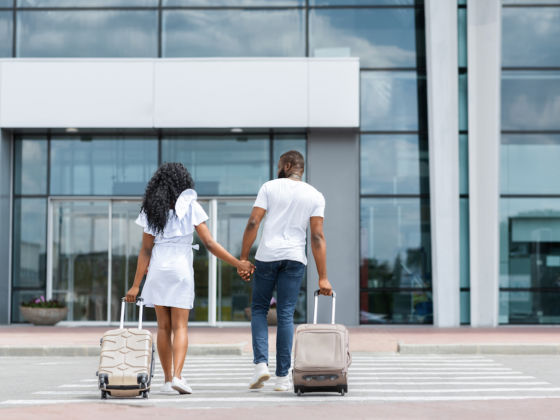It’s September, and the kids are back in school. Give them a couple of weeks to adjust to the new school year — and then start planning an adult getaway without them. Sure, we’re big proponents of having your kids travel, even when they’re young. But we also think parents should enjoy some alone time together without their offspring. It’s good for you both, and hence, good for the entire family. Here’s why you and your partner should take a kid-free trip and how to make it happen.

The Kids Are Back in School. Time to Take a Trip Without Them.
You probably already spend plenty of time with your kids.
A lot has been said about the amount of time parents in the US, UK, and Australia spend with their kids. It turns out to be far more than in many other countries. Even working mothers in the US spend as much time with their kids as non-working mothers did a few decades ago. That’s exhausting for parents and not necessarily good for their kids.
In How to Raise and Adult, Julie Lythcott-Haims in concerned with how over-parenting prevents kids from developing self-reliance and resilience. But she also notes that excessive doting on the kids is bad for parents, as well. “If you’re overfocused on your kid, you’re quite likely under-focusing on your own passion,” she writes.
Your kids need their independence.
Not only should kids not be the sole focus of your attention — since this puts a terrible burden on them to make you happy — but you should also give kids opportunities to fend for themselves. Okay, having doting grandparents watch them for a couple of nights might not qualify as fending for themselves. But it’s likely said grandparents, or whoever will watch your children, do things a bit differently than you do. Your children may have to be more in charge of their stuff for a couple of days and will learn that it’s okay if things diverge from the routine. Spending a night — or three or seven — without you will teach them that they don’t need you to step in for every small problem.
Happy parents make happy families.
Getaways are just plain good for a relationship. In fact, the married co-founders of the Gottman Institute — a Seattle company with an international reputation for successfully helping couples stay together — take a 10-day honeymoon together every single year.
Time away doesn’t just rekindle your connection with your partner. It also refreshes and prepares you to return to the daily chores of parenthood. Beyond that, it’s just a fun thing to do, and that’s a good thing. As the psychologist Madeline Levine wrote, “One of the most important things we do for our children is to present them with a version of adult life that is appealing and worth striving for.”
A parent getaway is easier to plan than a family vacation.

Photo: Ivanko80/Shutterstock
Organizing child care may be tough, and we’ll get to that in a moment. But when you’re planning a vacation for just the two of you, you can get one hotel room and rent a tiny car. You can drive four hours without stopping or finally use those airline upgrades since it’s just the two of you. You can fit everything into a backpack or a carry-on and arrive as late as you want; you’ll have no bedtimes to worry about. If you want, you can even book a room at a snooty wine country B&B that doesn’t allow kids.
Travel with the kids is wonderful, as is seeing the world through their eyes. But, let’s face it, you probably aren’t rolling into a bar after dinner with the kids. Or sleeping in until noon. And you definitely aren’t sneaking back to your hotel room before dinner for some couple’s time. Doing these things reminds you of why you two got together — and had those kids — in the first place.
You can work out the child care.
If you have parents of your own who can help with childcare, you’re in luck. You’re even luckier if they’re within driving distance. Ours are far away, so we’ve planned our getaways around their visits, dropped the kids off with them on our way somewhere else, or even flown the kids on their own to stay with their grandparents. It’s good for kids to spend more time with the older generation, and grandparents usually love feeling useful… as long as you don’t abuse their generosity by taking too long a trip.
Alternatively, maybe your child — or children — can spend the night at friends’ houses. You can return the favor by having those kids over some time; or, better yet, build up credit with sleepovers in advance of your trip. If you’re relying on another parent’s generosity, your trip may have to be as short as an overnight, but it’s still an escape for the two of you.
If you can afford a babysitter, agree on what you’ll pay ahead of time. The hourly rate should not be the same after 9:00 or 10:00 PM, when everyone is asleep, as it is during the day. Also, if your trip includes weekdays when the kids are in school — or when other parents can drive them places after school — be sure to deduct that from what you pay the sitter.
Prep the caregivers.
Don’t assume the caregivers know the routines in your house. Be explicit and write daily schedules, with such minute details as when the child’s likely to wake up (or when they should wake up if it’s a school day), what they’ll eat for breakfast, what they should put in their backpacks (like basketball shoes), and so on.
Attach a separate list with contact information for the both of you, for any parent who may drive them in carpool, the school receptionist, the pediatrician, the after-hours pediatrician, the dentist, and the like. Add phone numbers and addresses associated with afternoon activities, even if they seem unnecessary. Just remember that this is all new to the caregiver, and they want to know where your kids are.
Leave your kids’ health insurance cards with the caregiver. Also, type up, print out, and sign a brief statement giving your caregiver permission to make any medical decisions on your behalf during your days away. This all sounds like a lot, but make these lists once, and you’ll only have to tweak them for next time. Sitters should appreciate the level of detail. As to grandparents, hopefully it’ll impress them with your preparedness — as opposed to overwhelm them — and put them more at ease.
Give caretakers a break.
Whether the kids are with grandparents, other friends, or a sitter, try to take some of the burden off of people who aren’t used to taking care of your kids 24/7. If you can, set up playdates for them at other friends’ houses, and see if you can have carpools pick them up for any activities they may have. That will give caregivers a welcome break.
Do the grocery shopping ahead of time, and leave the kids with plenty of clean clothes and laundered sports uniforms to eliminate extra housework. Also, leave cash for additional groceries just in case.
Thank everyone who made it possible.
Always come back from your time away with a small gift — like specialty jam, chocolate, or some other trinket from a shop at your destination — for the people who drove your kid somewhere, had them sleep over, or cared for them in your house. Show them you appreciate that they helped you have a some time away with your partner.
A weekend is all you need.

Photo: mimagephotography/Shutterstock
Not everyone will have the available child care and days off to take a longer break. Often, though, all you need is a weekend away to feel like you’ve gotten a chance to be adults again. In fact, if you go on too long a trip right from the get-go, you may feel anxious about being away — and the trip will have the opposite effect as intended. If it’s your first time away from the little ones, it’s best to start with a weekend.
We organized our first trips around business travel, going for five days to France when our first was little. It felt long but was an incredibly reinvigorating break. Our 10-day trip to Japan, when our second was just two, felt like two days too many at their young ages — as we really started to miss the kids.
You can go anywhere.
If you do go for just a weekend, you can probably drive a couple of hours and be at a great place — maybe by a beach, a local wine region, or even another big city. Seeing it anew, without the kids around, will feel fresh and different, even if you’ve been there before. You can also tag on a weekend to one of each other’s work trips.
While you’re there, do some things you couldn’t do with your kids — whether that’s reading the newspaper at an outdoor cafe for an hour, bar-hopping, or just getting 12 hours of sleep. If you’re active types, you could surf all day, play an entire round of golf, or go scuba diving (which is only possible for kids over 10). The options are nearly endless.
So just pick a place and go.

Photo: Monkey Business Images/Shutterstock
If you’re positive and upbeat about your trip, your kids will realize it’s no big deal. Of course you should call them; but when you do, ask them what they’ve been up to and then tell them about what you two have been doing. Assume that everything is fine when you call; don’t call to be sure they are managing without you. They probably are.
Travel sharpens our senses, puts us into the present, and makes us more aware of where we are. When you travel with your partner, especially after a period of time focused on work and family, it puts the two of you back into the present together. It turns your attention back to each other. That’s a nice place for it to be because when you’re a happy, fulfilled couple, you are better parents, too.